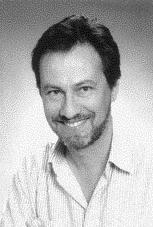|
|

Seventh
International Conference on UML
Modeling Languages and Applications
<<UML>>
2004
October 10-15, 2004
| Krzysztof
Czarnecki, University of Waterloo |
Generative
Software Development |
|
Abstract
System family engineering seeks to exploit the
commonalities among systems from a given problem
domain while managing the variabilities among
them in a systematic way. In system family engineering,
new system variants can be rapidly created based
on a set of reusable assets (such as a common
architecture, components, models, etc.).
Generative
software development aims at modeling and implementing
system families in such a way that a given system
can be automatically generated from a specification
written in a textual or graphical domain-specific
language.
In this talk, I will give an overview of the
generative software development process and
explore its relationship to Model Driven Architecture.
http://www.swen.uwaterloo.ca/~kczarnec/gsdoverview.pdf
|
|
Speaker's
profile
Krzysztof Czarnecki is an Assistant Professor
at the University of Waterloo, Canada. Before
coming to Waterloo, he spent 8 years at DaimlerChrysler
Research working on the practical applications
of generative programming. He is co-author of
the book "Generative Programming"
(Addison-Wesley, 2000), which is regarded as
founding work of the area and is used as a graduate
text at universities around the world. He was
General Chair of the 2003 International Conference
on Generative Programming and Component Engineering
(GPCE).
His
current research focuses on realizing the synergies
between generative programming and MDA.
http://www.swen.uwaterloo.ca/~kczarnec/
|
|
| |
|
|
| Desmond
D'Souza, Kinetium |
Goals,
Viewpoints, and Components - an MDA Perspective |
|
Abstract
MDA
is commonly described in terms of the separation
and interrelationship of Computation-Independent
Model (CIM), Platform Independent Model (PIM),
and Platform Specific Model (PSM). In working
with enterprise architecture we often grapple
with decisions that span business goals, existing
heterogeneous systems, migration, duplication
of processing and data, ownership, granularity
of components and applications, and mixtures
of logical and highly platform-oriented views.
In this talk we outline a fractal approach to
goals, viewpoints, and components consistent
with MDA that helps with some of these problems.
|
|
Speaker's
profile
Desmond
DSouza has worked in software systems, architecture,
and modeling since the early 80's. He developed
and co-authored the Catalysis method, published
by Addison Wesley in 1998 and an important positive
influence on UML. He was VP of component-based
development at Platinum Technology and Computer
Associates in the late 90's. Desmond is President
of Kinetium, a consulting company, and is a
respected authority and speaker at companies
and conferences. He can be reached at:
[desmond][dot][dsouza][at][kinetium.com].
|
 |
| |
|
|
| Oscar
Nierstrasz, Software Composition Group, University
of Bern |
Putting
change at the center of the software process |
|
Abstract
We
know that successful software systems are doomed
to change. But our programming languages and
tools continue to focus on developing static,
unchanging models of software. We propose that
change should be at the center of our software
process. To that end, we are exploring programming
language mechanisms to support both fine-grained
composition and coarse-grained extensibility,
and we are developing tools and techniques to
analyse and facilitate change in complex systems.
In this talk we review problems and limitations
with object-oriented and component-based development
approaches, and we explore both technological
and methodological ways in which change can
be better accommodated.
|
|
Speaker's
profile
Oscar
Nierstrasz is a Professor of Computer Science
at the Institute of Computer Science (IAM) of
the University of Berne where he leads the Software
Composition Group. Prof. Nierstrasz is the author
of over seventy publications and co-author of
the book Object-Oriented Reengineering Patterns
(Morgan Kaufmann, 2003).
He
is interested in all aspects of component-oriented
software technology, and particularly in the
design and implementation of high-level specification
languages and tools to support reusability and
evolution of open applications.
http://www.iam.unibe.ch/~oscar/
|
 |
| |
|
|
|
|

